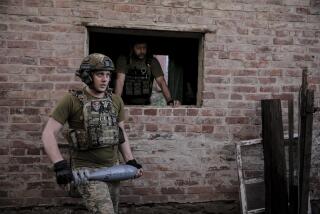A surge in punditry
With the fifth anniversary of the invasion of Iraq upon us, it seems to be generally agreed by most experts that the “surge” is working, that despite continuing casualties, we have at last reached a “turning point.” This is certainly the view of George W. (“Mission accomplished!”) Bush, Donald (“Stuff happens”) Rumsfeld, Dick (“The streets of Baghdad are sure to erupt with joy”) Cheney, Bill (“Military action will not last more than a week”) O’Reilly and Condoleezza (“We don’t want the smoking gun to be a mushroom cloud”) Rice.
But the above are all partisan voices. As far as we are aware -- and, as founders of the Institute of Expertology, we are experts on the matter -- until now no impartial institution has undertaken a comprehensive survey of experts on the war in Iraq. Therefore, our institute has taken it on itself to conduct such an inquiry.
For those who may have been too young to see, or are too old to remember, our original study, “The Experts Speak: The Definitive Compendium of Authoritative Misinformation” (1984), we recall that notwithstanding the best efforts of our worldwide cadre of researchers, we were unable to identify a single expert who was right.
At the time, despite those findings, our scholarly integrity compelled us to concede the statistical probability that, in theory, the experts might be right as much as half the time. It was simply that we hadn’t found any.
Our new study of the Iraq war, titled “Mission Accomplished! Or How We Won the War in Iraq,” is a different matter. We can state without fear of contradiction that never before in the history of institute surveys has there been such a dramatic consensus among experts -- those who, by virtue of official status, academic standing, formal title, mastery of jargon and/or number of publications, are presumed to know what they are talking about.
They all seemed to agree that:
* The link between Iraq and the Al Qaeda terrorists who carried out the 9/11 attacks was (to quote New York Times columnist William Safire) an “undisputed fact.”
* Saddam Hussein had weapons of mass destruction. (“Only a fool, or possibly a Frenchman, would think otherwise”: Washington Post columnist Richard Cohen.)
* The cost of war would be cheap at the price. (“We are dealing with a country that can really finance its own reconstruction”: then-Deputy Secretary of Defense Paul Wolfowitz.)
* The U.N.’s chief weapons inspector was unreliable. (Hans Blix “couldn’t find the stretch marks on Rosie O’Donnell”: Laura Ingraham, syndicated radio host.)
* Torture is justifiable. (“Reasonable people will disagree about when torture is justified”: John C. Yoo, then-deputy assistant attorney general.)
* Abu Ghraib was not all that bad. (Abu Ghraib “is no different than what happens at the Skull and Bones initiation”: Rush Limbaugh.)
* The U.S. won the war within weeks. (“The only people who think this wasn’t a victory are Upper West Side liberals and a few people here in Washington”: Charles Krauthammer, syndicated columnist.)
Although there were differences, the Great Consensus was bipartisan. Sen. John McCain (who said before the fact that “the Iraqi people will greet us as liberators”) observed in September 2003 that “the next three to six months are critical.”
Three months later, Sen. Hillary Clinton (who before the invasion had said that Hussein “will keep trying to develop nuclear weapons”) insisted that “the next six to seven months are critical.”
Barack Obama partisans may try to argue that the Illinois senator did not share in the consensus, but he lacked any foreign policy experience and therefore does not qualify as an expert and is excluded from our study.
Nevertheless, as scrupulous scholars, we concede that there was and is a small group of dissenters from the Great Consensus, but they are for the most part ordinary citizens or extreme left- (and far right-) wingers who don’t really count. Besides, they would only pollute our sample.
Finally, although the institute expresses no opinion of its own on the matter, we feel it is incumbent on us to note apropos the “surge” that there is ample precedent for the “turning point” thesis mentioned above:
* July 7, 2003: “This month will be a political turning point for Iraq.” (Douglas J. Feith, then-undersecretary for Defense.)
* June 16, 2004: “A turning point will come two weeks from today.” (President Bush.)
* Feb. 2, 2005: “On Jan. 30 in Iraq, the world witnessed ... a moment that historians might one day call a turning point.” (Donald Rumsfeld, then-U.S. secretary of Defense.)
* June 14, 2006: “I think -- tide turning -- see, as I remember -- I was raised in the desert, but tides kind of -- it’s easy to see a tide turn -- did I say those words?” ( Bush.)
We trust that the above abstract of our findings will convince any reasonable person that our study was as rigorous, systematic and serious as were the experts themselves.
More to Read
Sign up for Essential California
The most important California stories and recommendations in your inbox every morning.
You may occasionally receive promotional content from the Los Angeles Times.










